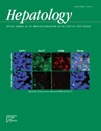Early determination of hepatitis C virus RNA may help to decide the duration of therapy for chronic hepatitis C virus genotype 2/3 infection†
Potential conflict of interest: Dr. Färkkilä consults for and advises Roche. He is consults for, advises, and received grants from MSD.
The Swedish Society of Medicine, the Swedish Medical Research Council, the Torsten and Ragnar Söderberg Foundation, Cancerfonden, the Swedish Society of Microbiology, Avtal om läkarutbildning och forskning (ALF) funds, and Roche affiliates in the Nordic region supported this study.
This letter was written for the NORDynamIC study group.
Diago et al.1 reported results for genotype 2/3–infected patients treated for at least 80% of the planned duration in the a randomized, open-label study of the effect of PEGASYS and ribavirin combination therapy on sustained virologic response in interferon-naïve patients with chronic hepatitis C genotype 2 or 3 infection (ACCELERATE) trial. Among patients achieving a rapid virological response [RVR; i.e., undetectable hepatitis C virus (HCV) RNA after 4 weeks of therapy according to an assay with a limit of detection of <50 IU/mL], sustained virological response (SVR) rates of 82% and 91% were observed for patients treated for 16 and 24 weeks, respectively. When this analysis was restricted to patients with a baseline viral load less than or equal to 400,000 IU/mL (25% of all patients), the SVR rates were 91% and 95%, respectively.
We recently presented results from a trial of HCV genotype 2/3–infected patients (the NORDynamIC study; n = 382) who received peginterferon alfa-2a weekly plus 800 mg of ribavirin daily for 12 or 24 weeks. Serial HCV RNA samples were analyzed with reverse-transcription polymerase chain reaction with a limit of detection of <15 IU/mL.2 Three hundred three patients (79%) received at least 80% of the target doses of peginterferon alfa-2a and ribavirin for at least 80% of the target treatment duration, and they were thus included in a per protocol analysis. In comparison with 12 weeks of treatment, 24 weeks of treatment resulted in higher SVR rates in patients with undetectable HCV RNA (P < 0.0001, chi-square test and Fisher's exact test), in patients with HCV RNA levels of 15-50 IU/mL (P = 0.02, Fisher's exact test), and in patients with HCV RNA levels < 50 IU/mL on day 29 (P = 0.009, Fisher's exact test). When this analysis was restricted to patients with a baseline viral load less than or equal to 400,000 IU/mL (n = 73), as suggested by Diago et al.,1 35 of 37 patients (95%) in the 12-week study arm achieved SVR, whereas 36 of 36 patients (100%) in the 24-week arm achieved SVR. These results support the idea that short-term therapy is suitable for patients with low baseline viral loads who achieve RVR and do not require major dose reductions.
However, the algorithm proposed by Diago et al.1 requires two HCV RNA analyses (at the baseline and in week 4). The results of the NORDynamIC trial imply that a single HCV RNA analysis with a cutoff level of 1000 IU/mL on day 7 predicts SVR as accurately as RVR and identifies at least as many candidates suitable for short-term therapy (28% versus 25% for the algorithm proposed by Diago et al.). Also, the suggested cutoff level of 1000 IU/mL is stably quantifiable by most currently available assays and is not prone to redefinition as the limits of detection of HCV RNA analyses further improve over time.
References
Martin Lagging M.D.*, Åsa Alsiö M.D.*, Nina Langeland M.D. , Court Pedersen M.D. , Martti Färkkilä M.D.§, Mads Rauning Buhl M.D.¶, Kristine Mørch M.D. , Kristoffer Hellstrand M.D.*, Gunnar Norkrans M.D.*, * Department of Infectious Diseases, Gothenburg University, Gothenburg, Sweden, Department of Infectious Diseases, Haukeland University Hospital and Institute of Medicine, University of Bergen, Bergen, Norway, Department of Infectious Diseases, University of Southern Denmark, Odense, Denmark, § Department of Gastroenterology, Helsinki University, Helsinki, Finland, ¶ Department of Infectious Diseases, Aarhus University, Aarhus, Denmark.




